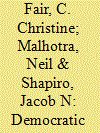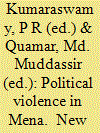|
|
|
Sort Order |
|
|
|
Items / Page
|
|
|
|
|
|
|
| Srl | Item |
| 1 |
ID:
121587


|
|
|
|
|
| Publication |
2012.
|
| Summary/Abstract |
The substantial literature on mass violence, from ethnic cleansing to civil wars, has paid surprisingly little attention to the largest instance of mass violence in human history: the Holocaust. When political scientists have approached the subject, the trend has been to treat the Holocaust as a single case, comparing it-sometimes controversially-with other instances of genocide such as Rwanda or Cambodia. But historically grounded work on the destruction of European Jewry can help illuminate the microfoundations of violent politics, unpack the relationship between a ubiquitous violence-inducing ideology (antisemitism) and highly variable murder, and recast old questions about the origins and evolution of the Holocaust itself. After reviewing new trends in history-writing, I highlight opportunities for social-scientifically oriented research centered on the interaction of state power, local communities, and violent mobilization in five areas: military occupation, repertoires of violence, alliance politics, genocidal policymaking, and resistance. My conclusion addresses thorny issues of comparison, morality, and memory.
|
|
|
|
|
|
|
|
|
|
|
|
|
|
|
|
| 2 |
ID:
133712


|
|
|
|
|
| Publication |
2014.
|
| Summary/Abstract |
A long-standing research tradition on political culture argues that greater support for core liberal values leads to a rejection of destructive political activities and reduced support for violent politics. In this vein, many contemporary analysts of security policy contend that a lack of democratic values in the Middle East promotes the development of violent political organizations. Unfortunately, there have been few direct tests of the hypothesis that an individual's rejection of democratic values correlates with support for militant groups. We conduct such a test in Pakistan using an original 6,000-person provincially representative survey. We find that strong supporters of democratic values are actually more supportive of militant groups and that this relationship is strongest among those who believe that Muslim rights and sovereignty are being violated in Kashmir. This is consistent with the context of Pakistani politics, where many militant groups use the principle of azadi (i.e., freedom and self-determination) to justify their actions. These results challenge the conventional wisdom about the roots of militancy and underscore the importance of understanding how local context mediates the influence of civic culture on political stability and violence.
|
|
|
|
|
|
|
|
|
|
|
|
|
|
|
|
| 3 |
ID:
170503


|
|
|
|
|
| Publication |
New Delhi, KW Publishers Pvt Ltd, 2020.
|
| Description |
xiv, 215p.hbk
|
| Standard Number |
9789389137385
|
|
|
|
|
|
|
|
|
|
|
|
Copies: C:1/I:0,R:0,Q:0
Circulation
| Accession# | Call# | Current Location | Status | Policy | Location |
| 059822 | 322.4/KUM 059822 | Main | On Shelf | General | |
|
|
|
|
|
|
|
|
|